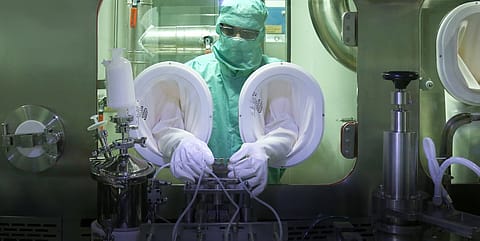Reliance's promising “off-balance sheet” item
Promoter-owned Reliance Life Sciences has made a niche for itself in the biopharmaceutical business

Reliance Industries (RIL) is strategically carving out its presence in the life sciences and healthcare space, a move that aligns with its broader diversification strategy.
The company has strengthened its diagnostic and digital healthcare ecosystem, with the acquisition of a 100% stake in Karkinos Healthcare for $42.7 million. Karkinos Healthcare, founded in 2020, is a technology-driven oncology platform offering innovative solutions for early detection, diagnosis, and management of cancer. Acting as a care partner during a patient’s cancer treatment journey, the company clocked $2.6 million in revenue in FY23.
Over the past five years, as per a Morgan Stanley report, the conglomerate has announced $13 billion in acquisitions, with 14% allocated to new energy, 48% to TMT (telecom, media, and technology), and 9% to retail. Of the total, the least investment ($54 million) has been made in the life sciences business. The Karkinos acquisition builds on Reliance’s earlier investments in Strand Life Sciences, a genomics and bioinformatics company, and Netmeds, one of India’s leading digital pharmacies.
But arguably the backbone of Reliance’s healthcare ambitions is Reliance Life Sciences Private Limited (RLSPL), a wholly owned promoter group company which is not part of the listed entity. Operating across verticals such as biopharmaceuticals, molecular diagnostics, regenerative medicine, and industrial biotechnology, RLSPL is a market leader in plasma proteins, biosimilars, and vaccines.
In FY24, RLSPL reported ₹2,205 crore in revenue, with its biopharmaceutical segment contributing a substantial 85% of this figure. With exports to 65 countries, international markets accounted for 46% of its revenue, demonstrating the global competitiveness of its offerings. RLSPL introduced five world-first biosimilars and has a pipeline of 23 biosimilars in the Indian market, underscoring its leadership in affordable and accessible therapeutics.
To meet growing demand and drive innovation, RLSPL is undertaking a ₹2,200 crore greenfield expansion at its Dindori, Nashik facility. This state-of-the-art centre will double the capacity of its flagship Dhirubhai Ambani Life Sciences Centre in Navi Mumbai. Scheduled for completion by September 2025, the facility will focus on manufacturing plasma proteins, biosimilars, gene therapies, and vaccines, according to a rating agency report.
This investment aligns with Reliance’s vision of becoming a leader in cutting-edge healthcare solutions. The expansion includes the development of pilot plants for gene therapy, a growing area of focus for the company, and increased capacity for producing vaccines to address domestic and global needs.
Recommended Stories
RLSPL’s financial performance highlights the sustainability of its growth with a PBILDT margin of 36%, delivering a PAT of ₹420 crore in FY24. With annual cash accruals in excess of ₹600 crore, supported by cash reserves of ₹364 crore, the company enjoys a low leverage ratio of 0.56x, ensuring financial flexibility for future investments.
A quick glance at its products on online pharmacy retail chains shows that Reliance Life Sciences, currently, has a product portfolio comprising: Injections/Infusions (34), tablets (4), and capsules (7) besides powders, gels, and ointments (4). All these products cater to diverse therapeutic areas, such as cancer treatment, anaemia management, immune system support, bone health, and autoimmune and inflammatory diseases.
Outside of RLSPL, the listed entity, Reliance Industries, owns Strand Life Sciences, a subsidiary which was set up in 2000. Headquartered in Bengaluru, India, the company, with an equity capital of ₹23.47 crore, is engaged in genomics-based research, offering services in bioinformatics, clinical diagnostics, and software development. The company’s revenue from operations climbed to ₹91.69 crore, an increase from ₹82.41 crore in FY 2023, a growth of 11.28%. However, total expenses surged to ₹101.97 crore, a significant increase from ₹81.36 crore the previous year. Employee benefits alone accounted for ₹68.61 crore, resulting in a net loss of ₹3.71 crore in FY 2024, compared to a profit of ₹13.68 crore in FY23. The company’s Delaware-based subsidiary, Strand Genomics Inc., which was set up to serve as a value-added reseller, and subcontractor for software services, too, ceased operations in 2016.
In the case of Netmeds Healthcare (formerly known as Netmeds Marketplace), the subsidiary operates in the healthcare and e-commerce space, offering services such as business consultancy, technical support, and advisory, as well as doctor consultations, diagnostic services, customer subscriptions, and the sale of pharma and over-the-counter products through its online platform and offline stores. In FY24, the company reported revenue of ₹67.24 crore, a 53.7% decline from ₹145.31 crore in FY23, even as its profit fell 29%, from ₹11.22 crore in FY23 to ₹7.96 crore in FY24, indicating pressure on profitability. Inventory levels rose from ₹49.12 lakh in FY23 to ₹183.16 lakh in FY24, suggesting an increase in stock for offline retail operations.
(INR CR)
While Reliance wants to make a mark in revolutionising India’s healthcare landscape, the immediate concern for investors will be how the conglomerate with a ₹16 lakh crore market cap tackles the weakening core O2C business even as it looks to ramp up its retail and telecom plays. Incidentally, it will be the first time in a decade that the RIL stock will end with a negative return.